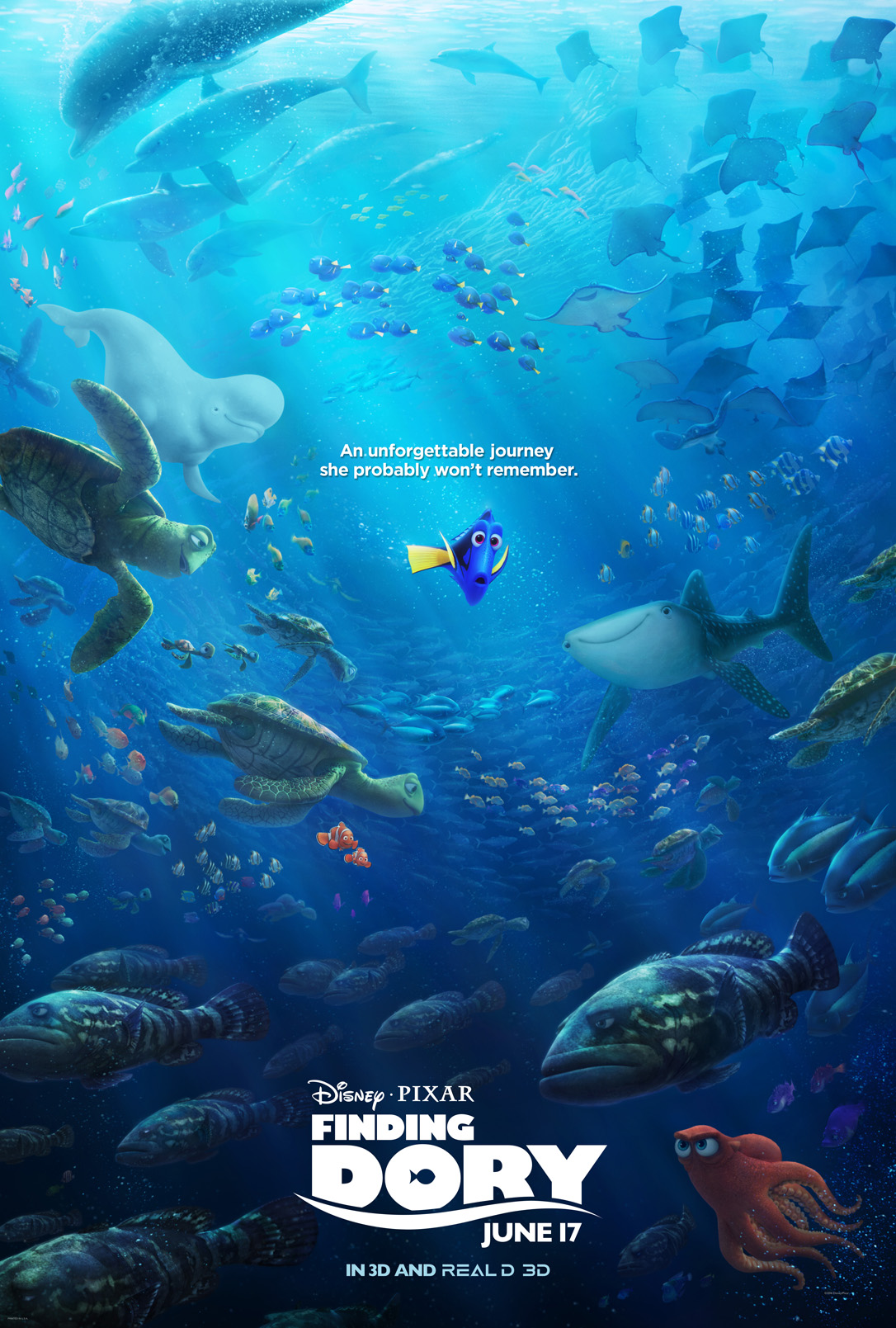I was invited by Disney•Pixar to attend an all expenses paid trip to cover the #FindingDoryEvent in Monterey CA. All opinions are my own.
Disney•Pixar’s FINDING DORY Swims into theaters on JUNE 17TH! My family and I are counting down the days!
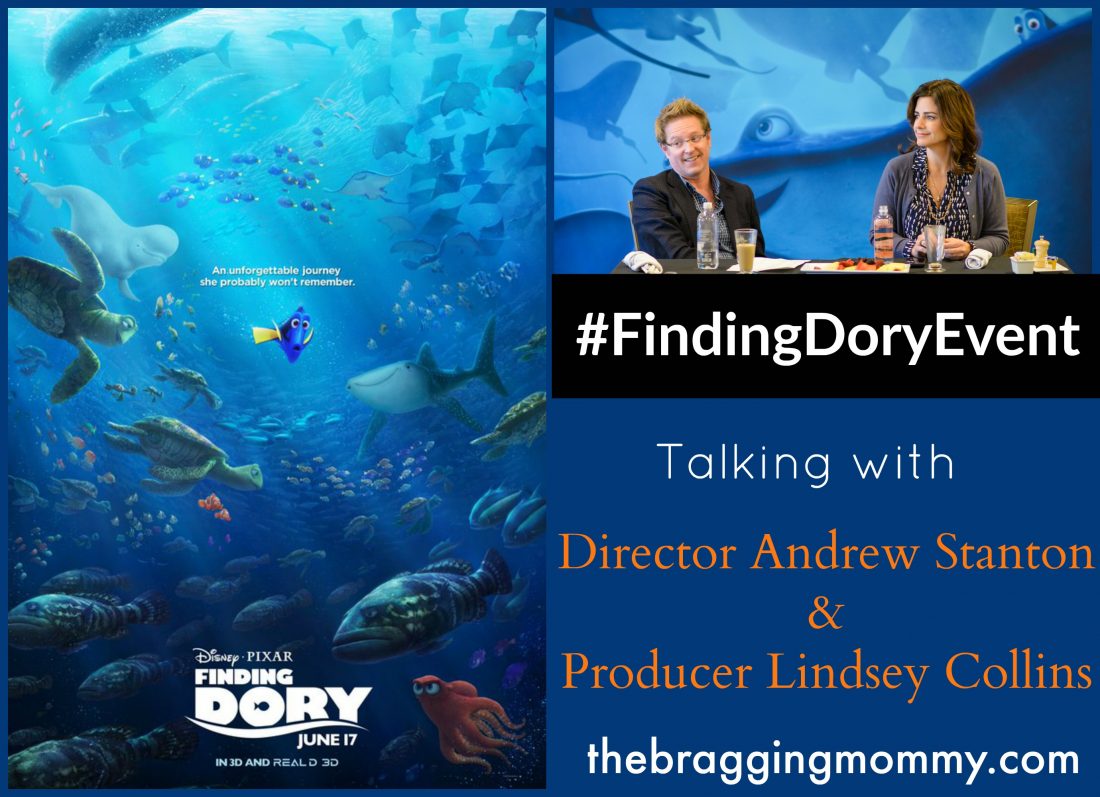
While I was in LA for the #FindingDoryEvent I got to see some sneak peeks at the movie, including the beginning. It has me even more excited for this film. What I saw was so great! It’s gonna be such a cute, fun, and heartfelt movie!
During the event, we had the chance to sit down with Director Andrew Stanton and Producer Lindsey Collins to learn more about the movie.
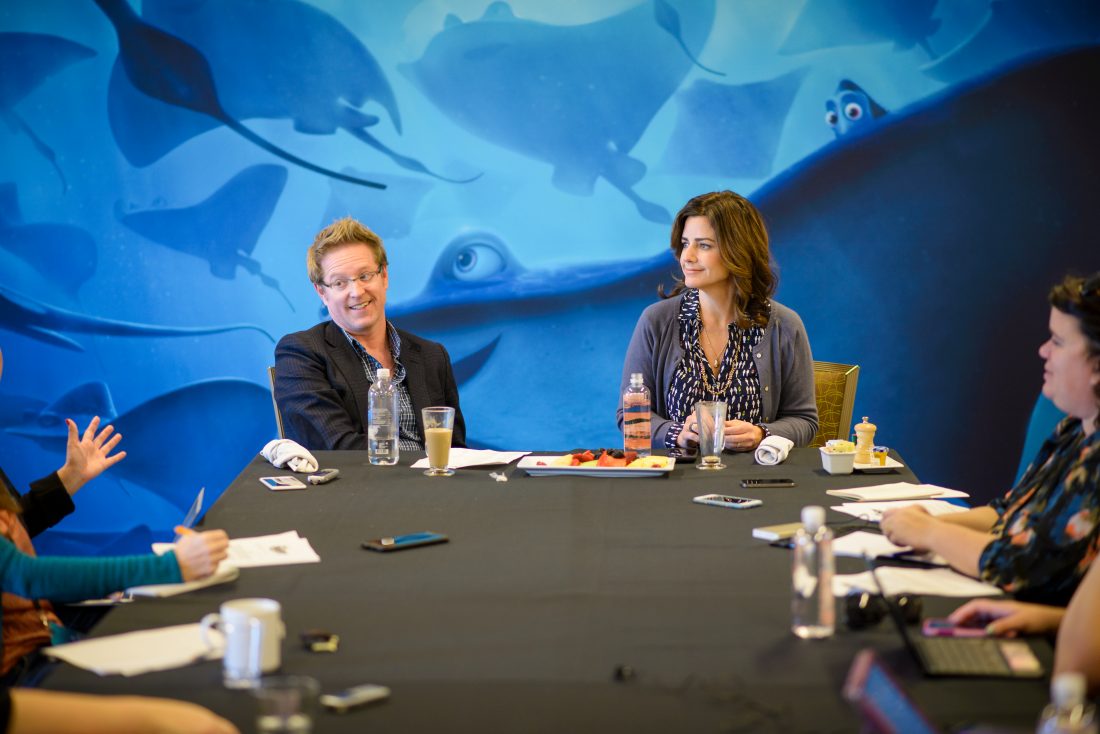
Do you guys have a favorite new character that is introduced in Finding Dory?
Andrew: That’s a tough one. They pop around. It was sort of the same in the first film. I think maybe it’s just because we spend a little more time with this character than any of the other new characters, is Hank. He’s just so gruff. But he’s got a heart of gold. He’s like your grumpy uncle. Or your grandpa. You just love putting him in uncomfortable situations and seeing him have to like deal with it.
Lindsey: And Dory’s so relentless. Her like genuine ‘I’m not gonna listen to your gruffness’. It softens him pretty quickly. And it’s Ed O’Neal, whose voice so perfect. ‘Cause it’s that like gruff but hiding this heart of gold.
I love Bailey, the beluga whale.
Andrew: The duo of Dusty and Bailey and just their back and forth. I could probably spend a lot more time with them.
Lindsey: Yeah. And they have a great kind of ending, too.

Do have voice actors in mind before you create some of these new characters?
Andrew: Sometimes yeah, sometimes no. Like for example on Nemo, I wrote with only Ellen in mind to do Dory. And that’s rare. I don’t think I’ve ever done that with anybody else. This film, I didn’t do that with anybody except for, I did always wish that if Dory ever did have parents, it was Diane Keaton and Eugene Levy. Like they were my dream casting. So blessed that they basically said, yes immediately. It was so exciting.
Lindsey: It was like, this is the easiest casting. And the Editor’s like, why am I even here?
Andrew: And if you’ve ever seen her [Ellen] with Diane Keaton, it’s just electric.
Lindsey: They like are the goofiest pair.
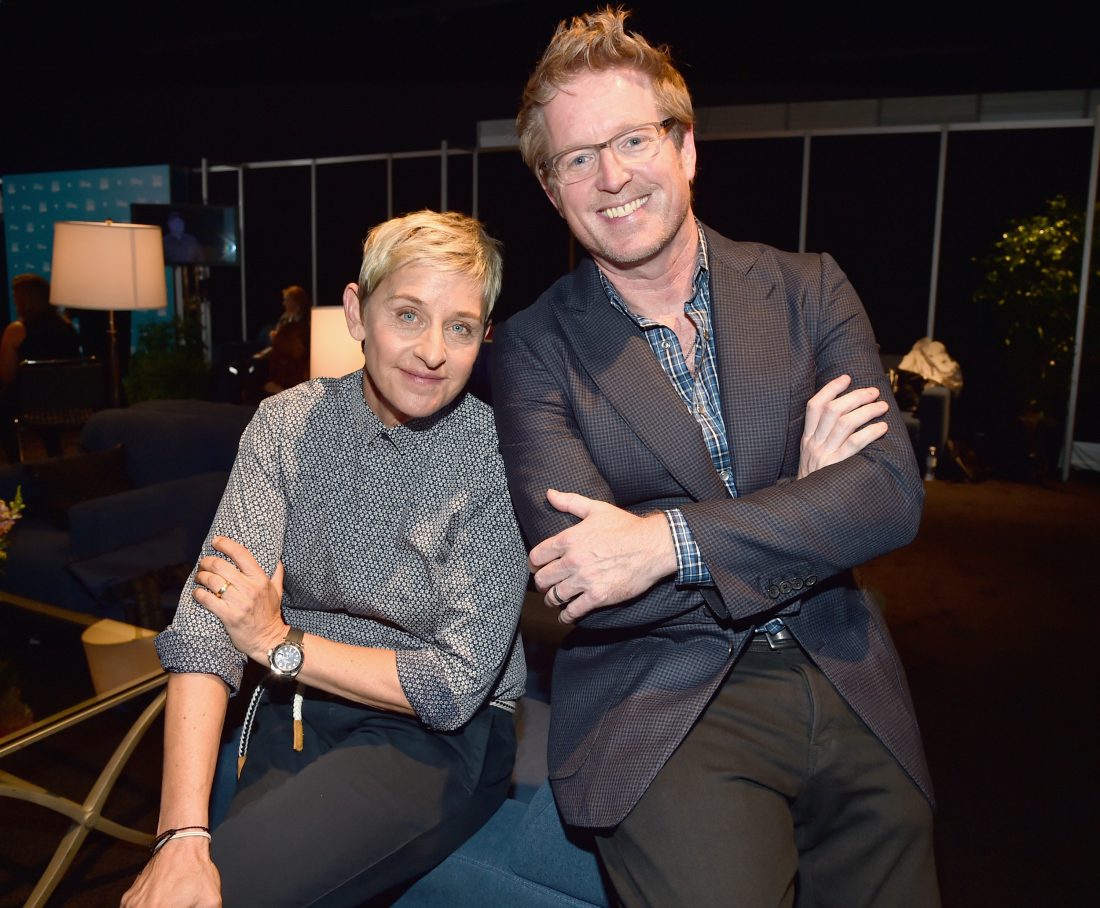
Speaking of Ellen, she’s been very public that she wanted a sequel. How did that factor into your organic growing of your story?
Andrew: Honestly, I held off for, what? 10 years?
Lindsey: 10 years.
Andrew: Yeah. So, it didn’t really affect me. I got a kick out of it. But, I did take a lot of pleasure, though, once I did have an idea. Thinking like, ‘oh, that’s gonna be a fun phone call’. I took about a year before it was something that was kind of official. I wasn’t gonna tease anybody before I knew it was for sure. But when I called her, I said, ‘well, uncle. We’re gonna finally do it’. And she said, ‘I was just kidding’. And just totally joking, pulling my chain. But, that’s very Ellen. And it was great. I mean, look at the world changed like 180 degrees when Nemo came out. Not only for me and my career. But particularly for Ellen and her show coming. Which was like either the month right before, right after that she aired it for the first time. So, the two are almost synonymous with each other. It’s very personal for her the role of Dory. She’s become–you can’t be bigger. And I hadn’t seen her in like seven years. And I didn’t know, has she changed? I mean, does that change a person? And when we had our first recording session, she drove herself. She came onto the stage, with the same Engineer. We were dressed the same. The room hadn’t changed. It was like Vegas. Like, nothing changes. It might as well been the last session we had in 2003. It was really comforting. It was a really nice sort of reunion. And it’s comfortable shoes. So we picked up where we left off. It was really nice.
Lindsey: And she’s been such a trooper. I mean, given how busy she is. In terms of how much she has going on. And every time we’d asked, she’s been like, ‘okay’. And she doesn’t shoot on Fridays. So she’s like, ‘yep, Fridays are yours’. And she comes in.
Andrew: I think she underestimated, she had a lot of recordings on the first movie. And she had a lot of screen time. It’s even more when you’re the main character.
Lindsey: Yeah. She’s in every scene.
Andrew: It’s a lot more work.
Lindsey: And she was great.
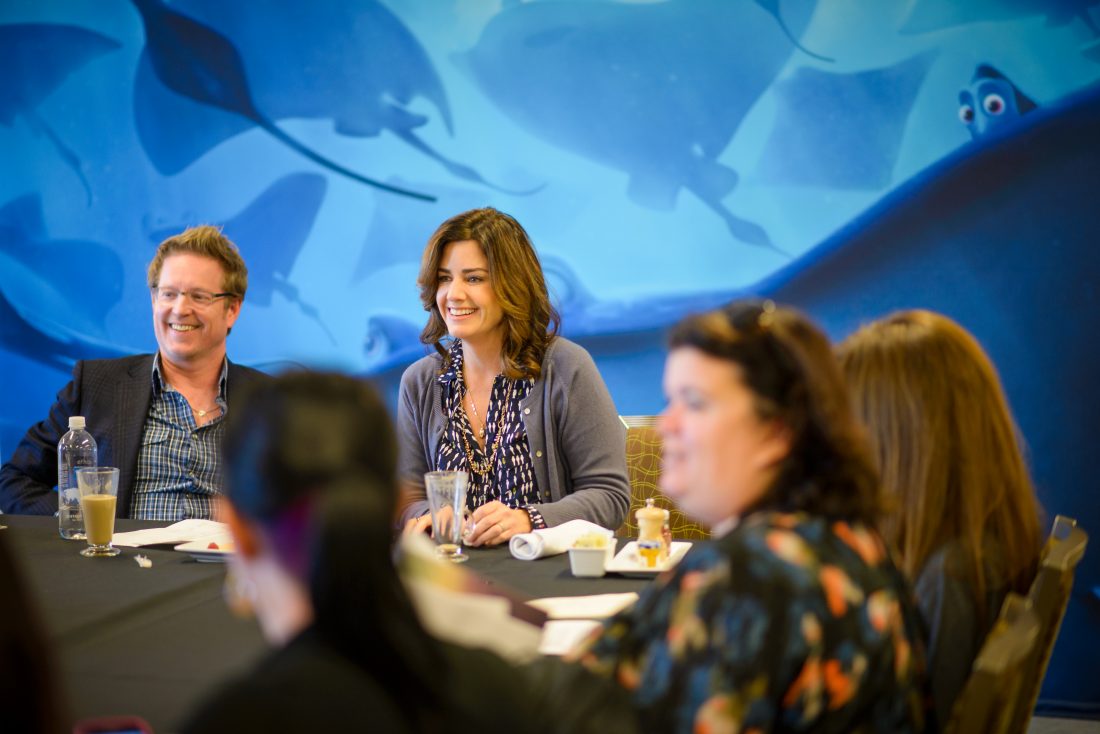
With the amount of time that’s passed, there is, obviously, like a new generation. When you guys were writing and making the movie, did you have those younger kids in mind that are gonna be seeing her the first time? Or the ones that grew up with it?
Andrew: No. There’s no way I can’t be influenced by the age of my kids at the time that I’m writing. Even thought I try to really not be influenced by anything. I had a six year old and a three year sold running around in my house at the time I started writing it. And they were 10 and seven by the time I finished Nemo. And that totally affects you. My dad was still alive then. And I was very young to have kids. And my dad was very young to have kids. We’re all very cognizant and present in each other’s lives. I always said I was the center of the telescope. I was keenly aware that I was the son of my father. And keenly aware that I as the father of my son. And I just thought I was in this real duality place that was kinda perfect to capture for the movie. And there’s no way, even if you’re not trying to, that that doesn’t affect how you’re writing stuff. So, on this one, my kids are out of the house. They’ve been out of the house for years. I’ve got a 23 year old and 21 year old. They started going to college when I started this movie. They’re both out of college now at the end of this thing. It just takes so long. And this movie’s more about figuring out who the heck you are? And danged if it isn’t me on the couch. Going through midlife crisis. And you learn to embrace those things. You don’t try to look for those things. Those things tend to just come out on their own. All I was worried about was Dory. But when I look back, I can go, ‘oh, yeah. I can see what I was wrestling with’. So, it was kind of the absence of kids that affected that. That’s the most directly I think about it.
Lindsey: I have young kids. So, you know, I mean, in the same way that we’d come in and tell stories of what happened in our day, as you do. Either what made you laugh about something they said. Or what you think would make them laugh. There are moments in this film that I’m like, ‘That is exactly what my kids say’.
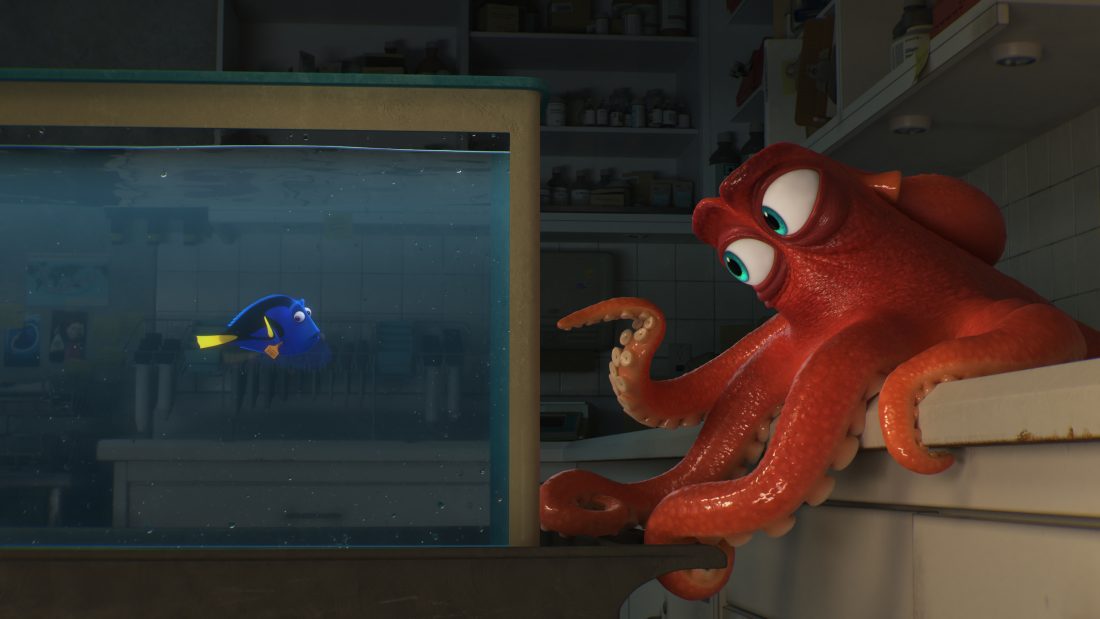
Since it takes so long to create the movie, what were the biggest shifts in the main story that you had to deal with?
Andrew: There was a lot. There’s a lot with all the pictures. So, this isn’t unique to this film. They probably go through about three or four versions of the movie that are sometimes vastly different from one another over four years. This one actually started out thinking it was going to be a little bit more directly of an adoption story. Because I thought, Dory sort of sits in the world of an adopted character. She doesn’t remember her or know who her original birth parents were. So, I knew there was kind of parallels to that. So I wasn’t trying to literally mimic that. But I was kind of interested. And I thought, ‘What if the parents found somebody else’? And for a while, the parents originally had short-term memory loss, too. Which turned out to be the worst idea in the world. And it made so many problems. But I loved the idea of this giant whale shark as a sister. So it kinda was a sister story for a while. And there was just too many things in the air. There were too many variables. And we just needed to simplify the story.
Lindsey: Well, because you ended up really caring about the sister. And how she felt about stuff. And in order to make it feel very much like Dory’s story. It was all about what’s in service to that. Like even if we love a character and what they’re doing and it’s not in service to her figuring out what she needs to figure out, we had to be like, ‘okay, take it out.’ It was like every time we had to say goodbye to a character we really loved, and think about what we needed to do for Dory.
I think another huge change for this film, that it took a really long time, is how we treated her memory. And what that meant. As you can imagine there’s a lot of pitfalls when you have a character who suffers from short-term memory loss. Trying to make sure that you’re being true to that. You’re not trying to pretend it doesn’t exist. You’re not being convenient with it to get the story moving forward. So, we always had to kind of be like, wait a minute, does that feel right? Are we playing her as smart as we know she is? Because everybody feels like they know Dory and there are things about her that we love. And it’s easy to fall into the trap of, she’s the sidekick. She’s funny. She’s silly. She’s all these things. The whole studio would instantly react badly if we played her wrong in any given scene. They’d be like, ‘that doesn’t feel like Dory’. And you go back and rewrite. It felt like that process took a lot of iteration to make sure that we felt like we were true to that character as she would be going through this big journey kind of herself.
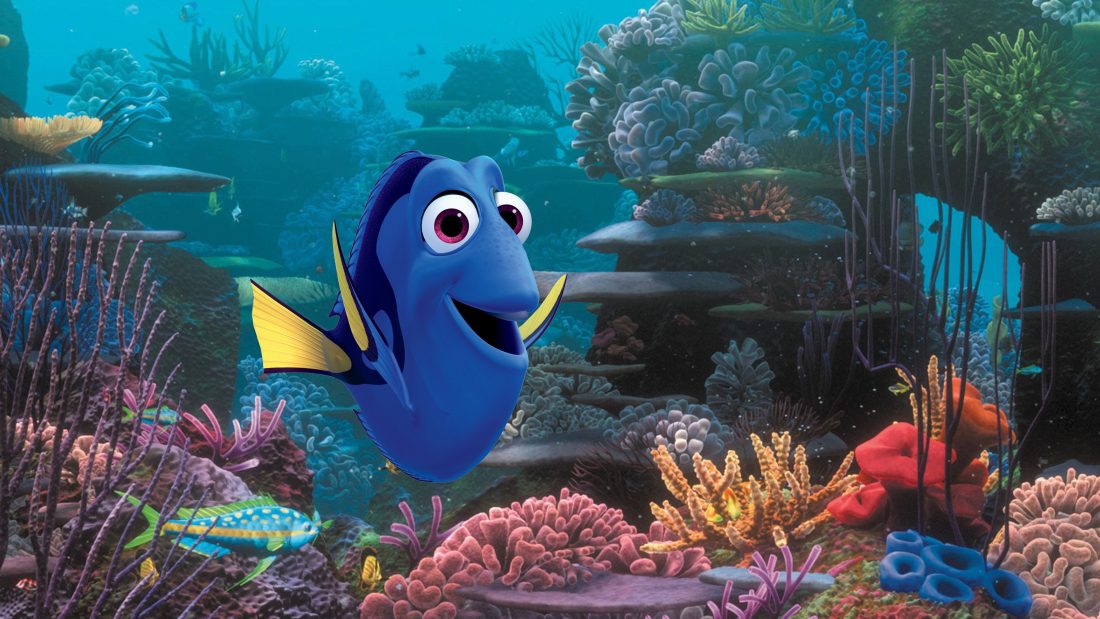
Andrew: This is more specific of the albatross around my neck and the other writer, Victoria. The stress we had to wrestle with for most of the movie was having a main character with short-term memory loss is the worsts idea in the world. Because you don’t realize until you’ve done that, that pretty much the way you show that somebody has growth and is changing over a movie is that they have moments of self-reflection. Sometimes they literally look in a mirror. And they go, ‘I feel like I hate myself right now’. And then in the middle of the movie they look in the mirror and ‘I feel a little bit better about myself compared to how I did yesterday’. But with a character with short-term memory loss they can’t do that. So, we had no way of tracking how Dory was changing and progressing. And it took us almost two years just to figure out that was the problem.
She started coming across very shallow and lighthearted. And a little ditzy. And we were like, ‘this isn’t the Dory we know’. But she had never been put as the person in the center. She had always been a supporting role. And we realized, that’s actually the problem with her in the world as a fish. She’s always been the caretaker. She’s always been sort of the one in service to someone else. It’s been her way of making sure that she won’t get ditched and be alone. It’s her way of guaranteeing that she won’t be alone deep down. She’s not conscious of that. And she had to learn how to be able to like that part of herself. And trust herself for all the things that she was just trying to hide by being nice, and being friendly. It ultimately became a really satisfying thing to conquer and to gift her with. But it was so hard to understand, and so hard to wrestle with.
Lindsey: We had to go back and watch the original film and be like, what are these moments that consciously or unconsciously were written into her character? That gave us clues to her ranting. There weren’t many. One is like, ‘can I help you?’ That’s what she always said, ‘can I help you?’ She was so willing to jump and help.
Andrew: She always said, ‘sorry’.
Lindsey: She always said, ‘I’m sorry, I suffer from short-term memory loss’. That was always her kind of introduction to herself, and how she defined herself. So she had these two kind of character definitions. If those are true to her today, what about those do we love? What about those do we try to change? Or evolve over the course of the film? I think the one that we all felt was the most important to change was her desire to always apologize for herself. She just takes the blame immediately. Must’a been me. She’s like, ‘oh, I’m so sorry. I’m a burden. I can’t remember anything’. And, so, we were hoping that by the end of the film, she could introduce herself in a way that wasn’t an apology. And, so, you know, I know that sounds kind of very — but it was like–
Andrew: That’s the tiny change. But it’s a huge, massive change for her over the course of the movie.
Lindsey: We feel like it’s kinda universal, too. We all have something that we feel like defines us in a way that we wish it didn’t. It could be physical. It could be mental. It could be just personality. It could be when I’m at my worst, I am this.
Andrew: We kept saying, see her weakness as her super power. How does she just embrace who she is? It’s the thing I really learned as a parent, all I can really do is make my kids aware of the temperament they were born with. They’re maybe always gonna be a little impatient. They’re maybe always gonna be a little rash. Or maybe they’re always gonna be a little bold. But all I need to do is teach them to own that. To be the first one in the room to just own what it is about them. That tends to take a lot of the sting out of those things that you tend to think maybe are off-putting at first. But if everybody else can talk about it, then it seems to diffuse it. I’m always looking for the universal aspect of something. No matter how specific it is. So, that it can relate as much to people as possible.
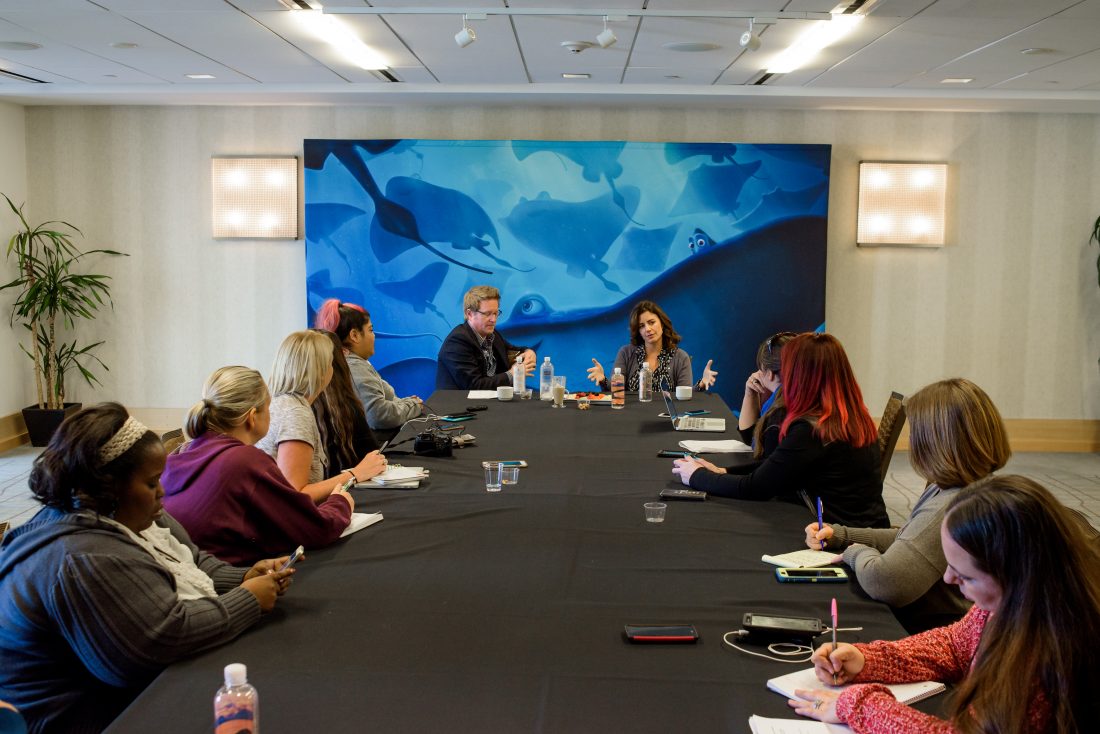
Tell me more about this Dory?
Andrew: I think the unconscious works very strange. I hadn’t watched the movie in years. And I had to watch it for some reason. I had to review something and I had to see it again. It had been about six or seven years. And I think you forget a lot more than you think. It’s like looking at old home movies or something. And then there’s details that just got stuck in my brain.
And then I started thinking about, wow, she didn’t change. She still has the same view of herself that she did at the beginning of that movie. And I do think she would get lost just as easily. And she would not lose these wonderful people that she’s found in her life. Which are Marlon and Nemo. And she’s found this new home. I always meant for her to sorta come from sorta tragic sense of loss. She has emotional memory. So, I knew she felt these feelings all the time, of loss, but couldn’t place them. And I hated that was unaddressed for her. That just kept lingering in me. And then I realized, I want her to be able to find her way back if she ever got lost again. As well as just figure out what her past is.
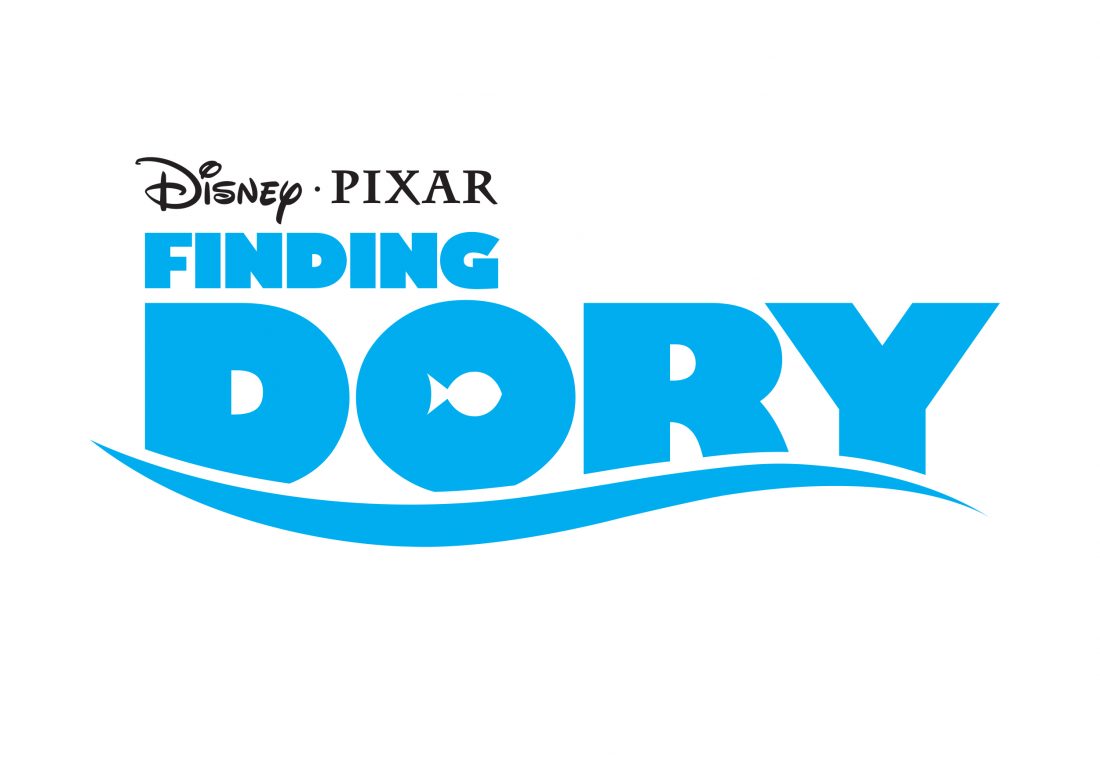
It was so great talking with them and getting all that insight into this upcoming movie. Are you as excited as I am to take your family to see it?
Disney•Pixar’s FINDING DORY Swims into theaters on JUNE 17TH!
Watch the trailer…
Grab Finding Dory Printable Coloring & Activity Sheets
Follow FINDING DORY on Twitter, #FindingDory #HaveYouSeenHer
Follow Disney/Pixar on Instagram
Follow Disney Studios on Pinterest
Visit Disney/Pixar on Tumblr
Visit the official FINDING DORY website
“Disney•Pixar’s “Finding Dory” reunites everyone’s favorite forgetful blue tang, Dory, with her friends Nemo and Marlin on a search for answers about her past. What can she remember? Who are her parents? And where did she learn to speak Whale? Directed by Andrew Stanton (“Finding Nemo,” “WALL•E”) and produced by Lindsey Collins (co-producer “WALL•E”), the film features the voices of Ellen DeGeneres, Albert Brooks, Ed O’Neill, Kaitlin Olson, Ty Burrell, Eugene Levy and Diane Keaton. “Finding Dory” swims into theaters June 17, 2016.“-Disney
